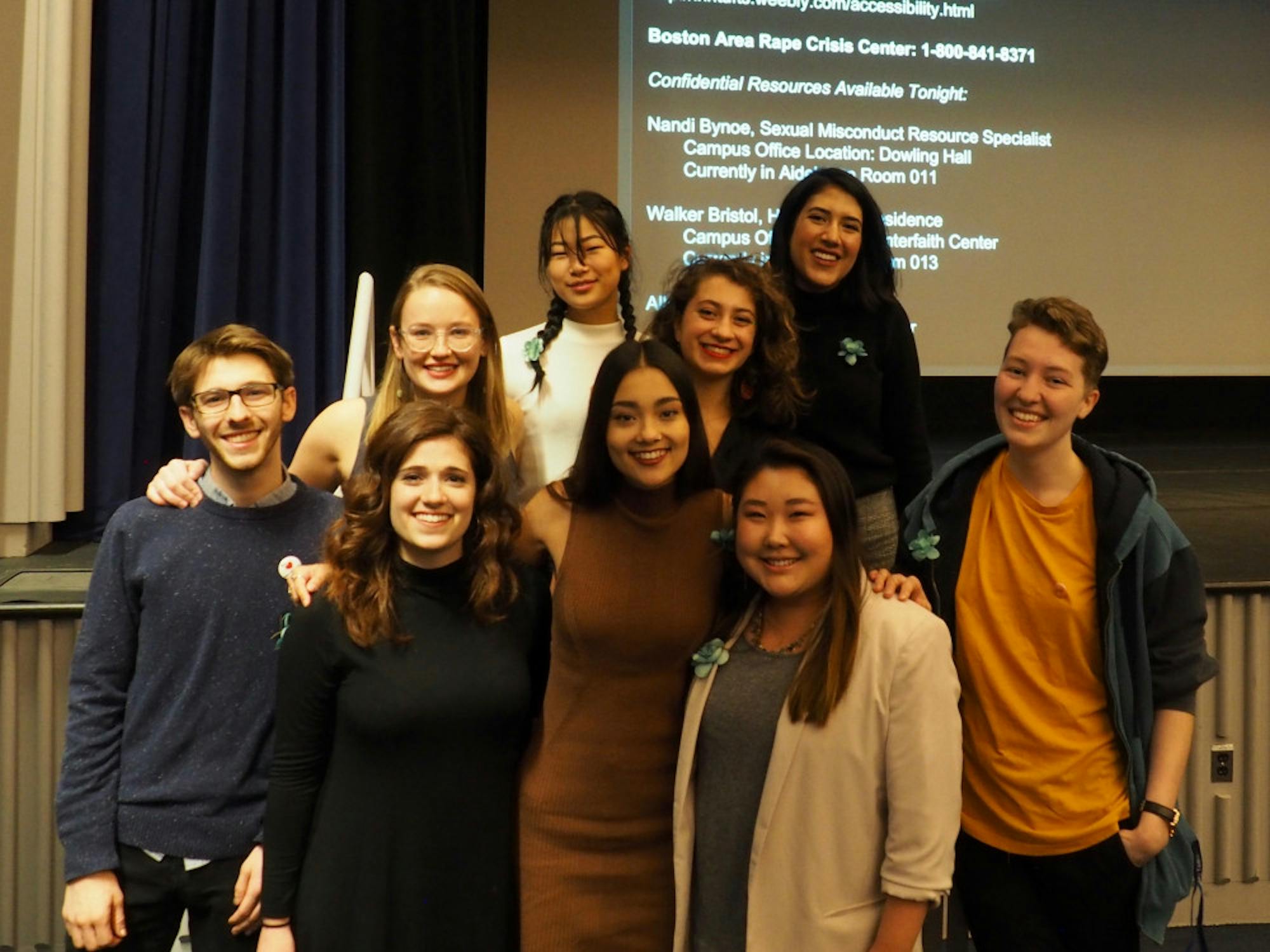Content warning: This article discusses sexual violence.
Twenty-four students read 24 narratives of sexual assault, abuse and harassment in Cohen Auditorium last night at the fifth annual It Happens Here event. Some of the narratives were read by the students who wrote them and others were read by volunteers — which were which was not specified.
The event was coordinated by a 10-person steering committee that was formed at the beginning of the semester. The committee included senior Bailey Siber, sophomore Evelyn Roozee and senior Ariel Weinstein.
According to Siber, the steering committee worked to make this year’s event more accessible than those in the past. These efforts included publishing the majority of the narratives online for the audience to follow along with during the presentation. The steering committee also made an effort to highlight the experiences of survivors of various identities.
“Survivors are not all just white cis females, and we want to represent the diverse experiences of people on this campus,” Siber explained.
The conversation began with a simple address. “Tonight, we will bear witness to each other’s experiences.”
Four students, who did not introduce themselves but were on the steering committee, explained the history of It Happens Here as a national organization, then gave an overview of what the audience could expect from the evening.
“Our hope is that this conversation expands and [evolves]," one student said. "We will remember why and for [whom] we are here."
The steering committee stationed three people in the Aidekman Arts Center and encouraged audience members to use them as resources if needed.
“This is not a performance,” another student explained, then advised the audience not to clap after the narratives.
Following the introduction, selected students went onstage one by one to read their narratives or the narratives of an unidentified survivor to the audience. It was purposely unclear whether the narratives belonged to the reader or not. Some of the narratives were only a sentence long, while others lasted several pages. One student read a Rupi Kaur poem.
“What’s really important about this event is magnifying voices that are already there. This event isn’t creating narratives or creating voices or experiences, this is about us helping people access a platform from which they can share their stories and share what they want to share,” Weinstein said. “We want to make sure that we’re not saying that we’re giving them a voice, but rather we’re giving them a place to project their voice louder than it could be.”
The goal of the event, according to the steering committee, is to foster empathy for survivors and equip audience members with the skills to be intentional listeners.
“I really hope that people come away from this event with a greater and deeper understanding of how vulnerable people may have to be in order to share their stories," Weinstein explained. "And that people walk away from this...with more knowledge and skills about how to graciously talk to people after they disclose sensitive information."
Siber and Roozee emphasized the importance of creating a space for survivors where they could feel heard and safe while changing the narrative that sexual assault does not happen at a school like Tufts.
“I think that sometimes Tufts is kinda seen as a liberal campus that doesn't experience these things, which is definitely not true, and I think it’s important that we shed light on how sexual assault has a role on our campus,” Roozee said.
“The people that should be defining what safety means are the people that don’t feel safe. I want the folks that attend this event to think about the fact there are people on this campus, for a huge variety of reasons, that don’t feel safe here,” Siber added.
Weinstein also acknowledged that survivors may have been in the audience, and this event was not intended to place pressure on them to share their narratives. Rather, it should provide resources for survivors and demonstrate the sensitivity and willingness of their community to engage in these conversations.
“I really hope that if there are survivors who came to this event and didn’t want to share their own narrative, that there’s an understanding and acknowledgement for themselves and from their friends and communities, that that is okay ... and that not everyone should feel that they need to submit their narrative to an event like this,” Weinstein said.
After the final narrative was shared, four different members of the steering committee returned to the stage and thanked the audience for listening. They urged students seeking support to decompress at the Interfaith Center after the event.
“It happens here at Tufts, and you are not alone. Thank you,” the students concluded.
'It Happens Here' projects voices of sexual assault survivors'

Members Action for Sexual Assault Prevention (ASAP) pose for a portrait in Cohen Auditorium before their fifth annual It Happens Here event.





